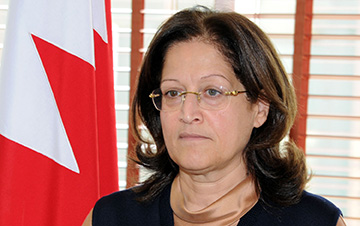ID :
322651
Tue, 04/01/2014 - 15:14
Auther :
Shortlink :
http://m.oananews.org//node/322651
The shortlink copeid
International human rights organisations support terrorists, says Minister

Manama, Mar. 30. (BNA) – Minister of State for Information Affairs and the Government's Official Spokesperson Sameera Ebrahim bin Rajab said that a major project is currently being implemented against the whole region, noting that Arab countries, be it those which went through changes, those expecting change or those which have overcome it, like Bahrain, admit that an organised and systematic plan, was prepared a long time ago, is staged against them.
In an Interview with Elaph online newspaper, the Minister of State said that the Arab media, including the Bahraini one, has not been up to the challenge as it lacked the needed infrastructure to face the sudden changes, stressing that the project was launched since the beginning of the new millennium, with the collapse of the two towers in New York.
"The process of changing the global system began in September 11, 2001, and since then the so-called 'Islamic terrorism' was created," she explained, adding that the whole region came under attack and was blamed for the outbreak of terrorism because of lack of democracy claims.
The targeting of the ruling systems across the Arab world and the "exportation" of democracy to them started since 2001 and still continues.
She pointed out that soon after the end of the Cold War, a new enemy-Islamic terrorism- was created to replace the communist one, and a new plan to bring about change in the region, stated by former US Secretary of State Colin Powel on the eve of US invasion of Iraq in 2003, was launched.
She said that the Arab media was weak and incapable of coping with the new situation, noting that preparations for the implementation of the plan against the region had started as early as the 1990s with the demonisation of the ruling systems.
She stressed that Arab media was old-fashioned and should be developed in order to cope with all situations.
Regarding the case against Al-Manar Channel, Sameera Ebrahim Rajab said that "like any other media outlet supported by Iran, it (Al-Manar TV) continues to cause harm to Bahrain and has played a major role in distorting its real image," adding that the Arab States Broadcasting Union pledged to take actions against it.
Concerning the Bahraini media, she asserted that the kingdom is making concrete steps to develop the sector, stressing that tremendous efforts have to be exerted to counter attempts made by some international human rights organisations, countries and activists to seek information from opposition groups and convince them that official sides are the most credible.
"Despite the fact that the opposition in Bahrain has been engaged in terrorism, chaos, lies, baseless allegation and claims to be victims -although it does not believe in democracy and advocates an ideology of political Islam and terrorism- some international human rights organisations persist in backing it, which poses many questions on the nature of the sides we are actually facing and dealing with," she underlined.
She emphasised that the three major international organisations, based in the USA, Britain and France, and their subsidiaries, "support groups of violence and terrorism in our region, and consider the messages of the ruling systems and government incredible, which is part of the efforts mobilised to support the project aiming to bring about comprehensive change in the region," noting that "you cannot convey your message if you don't have all the intellectual, political and technical mechanisms and a well-established media framework."
Regarding the national groups which adhere to change through official and constitutional channels, the Minister of State said that they did not have a clear project or a strong media strategy, and therefore, have to rectify their mistakes and play a greater role in facing violence, terrorism and attempts to deliberately demonise the state.
She stressed that Bahrain had to face the project aiming to spread chaos in the region through violence and terrorism through a number of means in order to counter the efforts of international media to project an image of the region's countries as instable and failing ones with no rule of the law.
She pointed out that despite all the challenges, the Bahraini media had made confident strides and succeeded in making its voice heard.
She said that while many Arab countries were unable to resist, Bahrain overcame the "difficult" security situation in 2011, with "minimal damages" because "we were capable of conveying our honest voice."
"Despite the opposition's invented stories of blood and murder, the Bahraini media succeed in showing that they were no more than baseless mere lies," she said.
She said that the five-year plan and the new media law will develop the Bahraini media sector and enable it to cope with all the challenges, explaining that the Information Affairs Authority has signed a number of agreements with international news agencies and media establishments to enhance training of Bahraini media cadres.
She affirmed that the official media in Bahrain had remained neutral and distanced itself from the prevailing polarisation and "extremist and sectarian" discourse, explaining that Bahrain TV had focused on the cultural, social and scientific sides and kept itself away from polarisation.
She added that IAA relied on Bahrainis and its policies focus on national interests.





